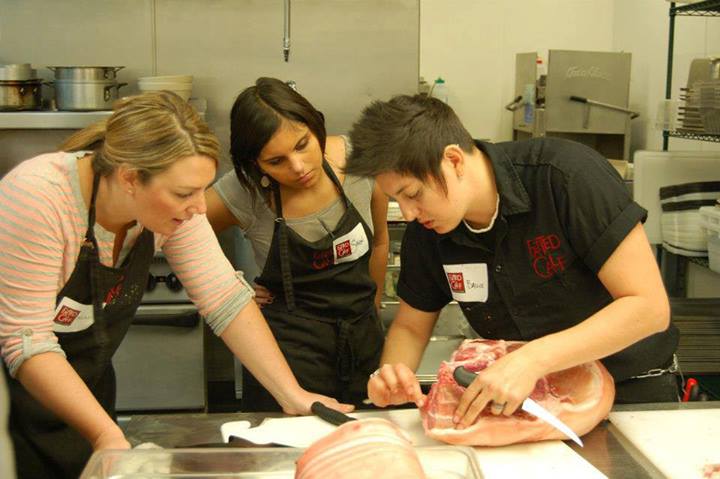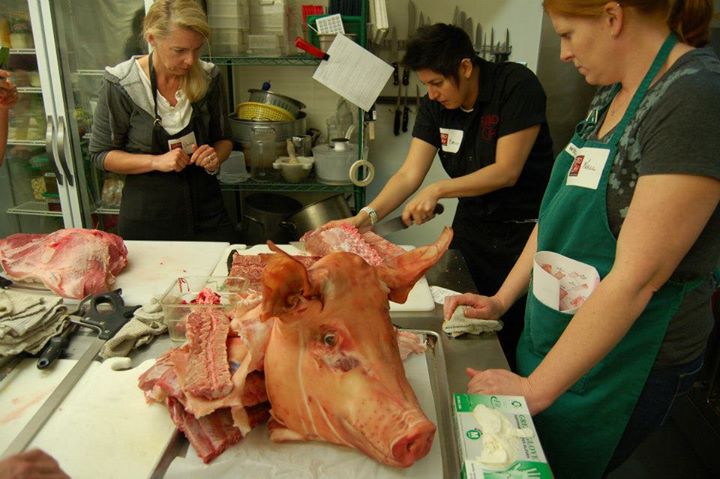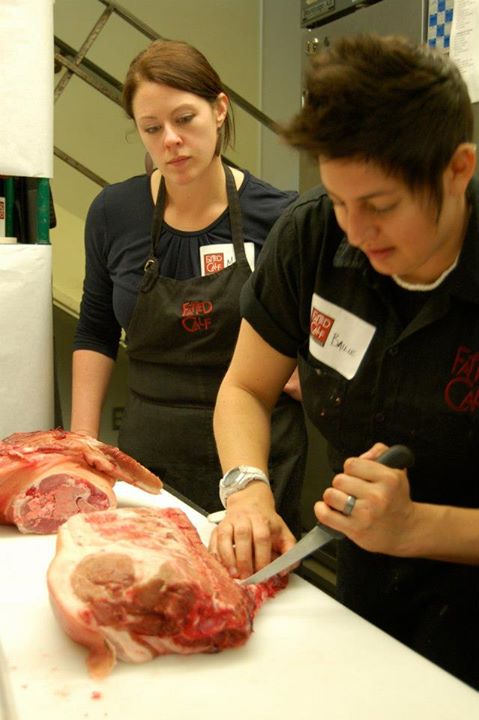
Heather Bailie—widely known as Bailie—is a Bay Area charcuterie and meat expert via her work as a butcher, operations manager and partner for Fatted Calf, the meat emporium with shops in Napa and San Francisco. Fatted Calf sells meat from smaller family farms, alongside handcrafted (and delectable) pates, beef jerky, terrines, sausage, bacon and salumi (pancetta tesa, salame Toscano, and a personal favorite: an herby roll of cured pork belly).
Bailie currently lives in Napa and has a meaty side project called Pig + Woman + Knife, which has two components. The Pig + Woman + Knife blog demystifies meat buying and butchery, and has photos and tips. She also takes the Pig + Woman + Knife meat knowledge directly to people by giving butchery classes and hands-on demonstrations for smaller groups. Yes, women can take her classes, but she also teaches groups with both genders. Baile told Bay Area Bites that she helps at “Pig Parties” for her friends, and will bring her hacksaw and knives to break down a pig and, say, help the group make sausage.
Her reasons for creating Pig + Woman + Knife:
“Stemmed from my experience working with the "fathers" of the Bay Area butchery and charcuterie scene. During my culinary upbringing, I was fortunate to work alongside some very talented meat masters, all of whom inspired me to keep a knife in my hand. This interest in butchery, paired with a background in animal right's activism, a degree in Women's Studies and a strong urge to do something creative, led me to create Pig + Woman + Knife."
"What started as a simple blog to share knowledge with other women cooks and build community through cutting meat, eventually evolved into an educational site to reach a much broader audience—from home butchers to professionals alike. This website is devoted to showing people how buying whole animals (or rather large pieces of one) and learning a few skills will save money and time and can be a fun hobby! Going whole animal also supports local family farms and small businesses. I hope viewing this site helps to take the intimidation and confusion out of buying meat, clearly demonstrates what to do with it and inspires you to learn some traditional preparations and cooking techniques.”
Baile has a degree from the California Culinary Academy and did restaurant work at Acquerello and Ubuntu before “stalking” Taylor Boetticher and Toponia Miller, the husband and wife team behind Fatted Calf. Bailie has an animal activist background and was a “card carrying PETA member and vegetarian.” Her gateway meat to break her vegetarian diet did eventually come: a late night drive-thru meal of a Jack in the Box hamburger caused her to indulge a strong meat craving with a friend. Bailie now eats slices of mortadella for breakfast daily and samples meat freely for work and pleasure. Bay Area Bites caught up with Bailie recently while she butchered at the Fatted Calf Butcher's Happy Hour on a Wednesday night with Ren Rossini in San Francisco. We first talked in Napa at the Oxbow Market. Her comments have been edited for clarity and grammar.

